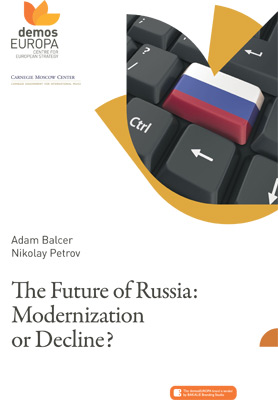Source: demosEUROPA – Centre for European Strategy and Carnegie Moscow Center Report
 Russia as a permanent member of the UN Security Council and nuclear power remains a key player in Eurasia with a substantial leverage in the post-Soviet space and, at the same time, the most important neighbor of the EU. However, in the coming decades Russia will face serious challenges to its internal prospects and international position. The further rise of China, negative demographic trends (shrinking population, emigration of well-educated people), substantial increase of the share of Muslim population, degradation of its infrastructure, unsustainability of the current economic model and rampant corruption are the most important factors which will impact on Russia’s future and by default on the EU’s. Certainly, Russia’s democratization would substantially increase its ability to face these challenges and impact positively on EU-Russia relations. A recent awakening of the Russian society created a new window of opportunity for the country’s genuine modernization and democratization.
Russia as a permanent member of the UN Security Council and nuclear power remains a key player in Eurasia with a substantial leverage in the post-Soviet space and, at the same time, the most important neighbor of the EU. However, in the coming decades Russia will face serious challenges to its internal prospects and international position. The further rise of China, negative demographic trends (shrinking population, emigration of well-educated people), substantial increase of the share of Muslim population, degradation of its infrastructure, unsustainability of the current economic model and rampant corruption are the most important factors which will impact on Russia’s future and by default on the EU’s. Certainly, Russia’s democratization would substantially increase its ability to face these challenges and impact positively on EU-Russia relations. A recent awakening of the Russian society created a new window of opportunity for the country’s genuine modernization and democratization.
This report composed of two articles “The Cat That Walks by Himself: Russian Foreign Policy at the Beginning of the Twenty First Century” written by Adam Balcer, programme director at demosEUROPA, and “Russia’s Uncertain Future: Internal Dynamics and Possible Trajectories” written by Nikolay Petrov, scholar-in-residence at the Carnegie Moscow Center, is trying to find answers to three crucial questions:
- What are the most probable scenarios for Russia’s internal development?
- What implications will have developments in the world and particularly in Eurasia on Russia’s foreign policy and its international position?
- How could the EU in the most efficient way make an impact on internal processes in Russia?
